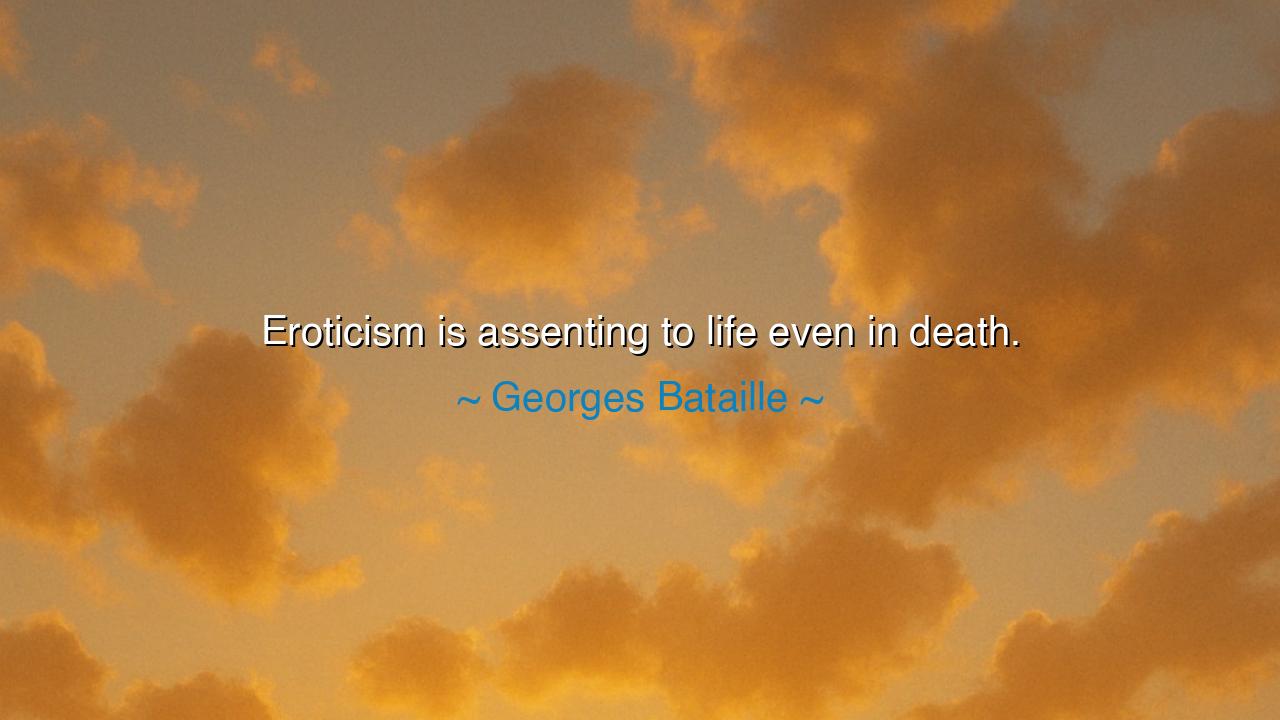
Eroticism is assenting to life even in death.






The words of Georges Bataille — “Eroticism is assenting to life even in death.” — are like a flame burning in the night of human understanding. They speak not only of desire but of the eternal dance between life and mortality, between the body that lives and the fate that consumes it. In these few words, Bataille captures a truth both ancient and forbidden — that eroticism, in its deepest essence, is not merely an act of pleasure, but a spiritual gesture: a defiance against the void, an affirmation that even in the face of death, life insists on being felt, celebrated, and known.
To grasp his meaning, one must first understand that Bataille did not speak of eroticism as lust alone, but as the human yearning for union — with another, with the cosmos, with existence itself. In that yearning lies both creation and destruction, for every act of love carries the shadow of its end. When two beings meet in passion, the boundaries between them dissolve for a moment; they taste eternity, yet that eternity fades as quickly as it comes. It is this fleeting union — beautiful because it is impermanent — that Bataille saw as sacred. In embracing desire, we embrace transience, and in doing so, we whisper our assent to life, knowing it is bound by death.
This wisdom is not new. The ancients understood it in the myths of Eros and Thanatos — Love and Death — twin forces intertwined since the dawn of consciousness. In Greek mystery cults, the act of union was not shameful but holy, a ritual echo of the cosmos’ creation. The Egyptian goddess Isis, in her mourning for Osiris, revived him through love; her devotion brought life from death itself. Thus, even in mourning, the erotic force was an affirmation that life persists — that creation springs from destruction, and joy from sorrow. Bataille’s insight is but a modern voice in this timeless chorus, reminding us that love and death are not enemies, but reflections of one another.
In the human heart, fear of death often gives birth to repression — the denial of our own desires, the refusal to feel deeply lest we also feel loss. Yet Bataille challenges this fear. To live fully, he says, is to embrace the risk of ending; to love is to accept the pain of separation; to feel pleasure is to acknowledge impermanence. The wise understand that death does not diminish life — it defines it. The flower’s beauty lies in its briefness. The kiss burns with meaning precisely because it cannot last. To assent to life, even in death, is to say: “Yes, I will live, even though I know I will die.”
Consider the story of Antony and Cleopatra, whose love defied empire and reason. Their passion consumed them, yet in the end, they chose death together rather than life apart. Though tragic, their union transcended mortality; it became legend. They embodied what Bataille described — a surrender to the fullness of being, where love, pain, and death converge into one radiant moment of existence. Their story teaches that the deepest love is not the one that avoids suffering, but the one that accepts it as part of the sacred whole.
This truth also shines in the life of Vincent van Gogh, whose art burned with the intensity of one who lived at the edge of despair. His canvases pulse with erotic energy — not of the flesh, but of the spirit — a raw, unfiltered engagement with life’s beauty and agony. In his madness and loneliness, he still painted the light. That is what Bataille meant: to create, to desire, to feel, even when surrounded by death, is to assent to life with one’s entire being.
The lesson, then, is not to flee from darkness, nor to fear desire, but to recognize that both are part of the same divine cycle. To be human is to burn, to long, to ache — and through that ache, to know that we are alive. Seek not a life of safety, where no pain can reach you, for such a life is already a kind of death. Instead, embrace the fullness of your experience — the joy and sorrow, the love and loss, the birth and decay. Each moment, no matter how fleeting, is a thread in the eternal tapestry of being.
Thus, let Bataille’s wisdom be your guide: Live passionately, without shame. Love deeply, even knowing it will one day end. Do not run from the shadow of death, for within it shines the brilliance of life. To assent to life even in death is to claim one’s place in the great mystery — to stand, unafraid, in the storm of existence, and say, “Yes — I am here. I will feel it all.” For only those who dare to love amid mortality can truly say they have lived.






AAdministratorAdministrator
Welcome, honored guests. Please leave a comment, we will respond soon